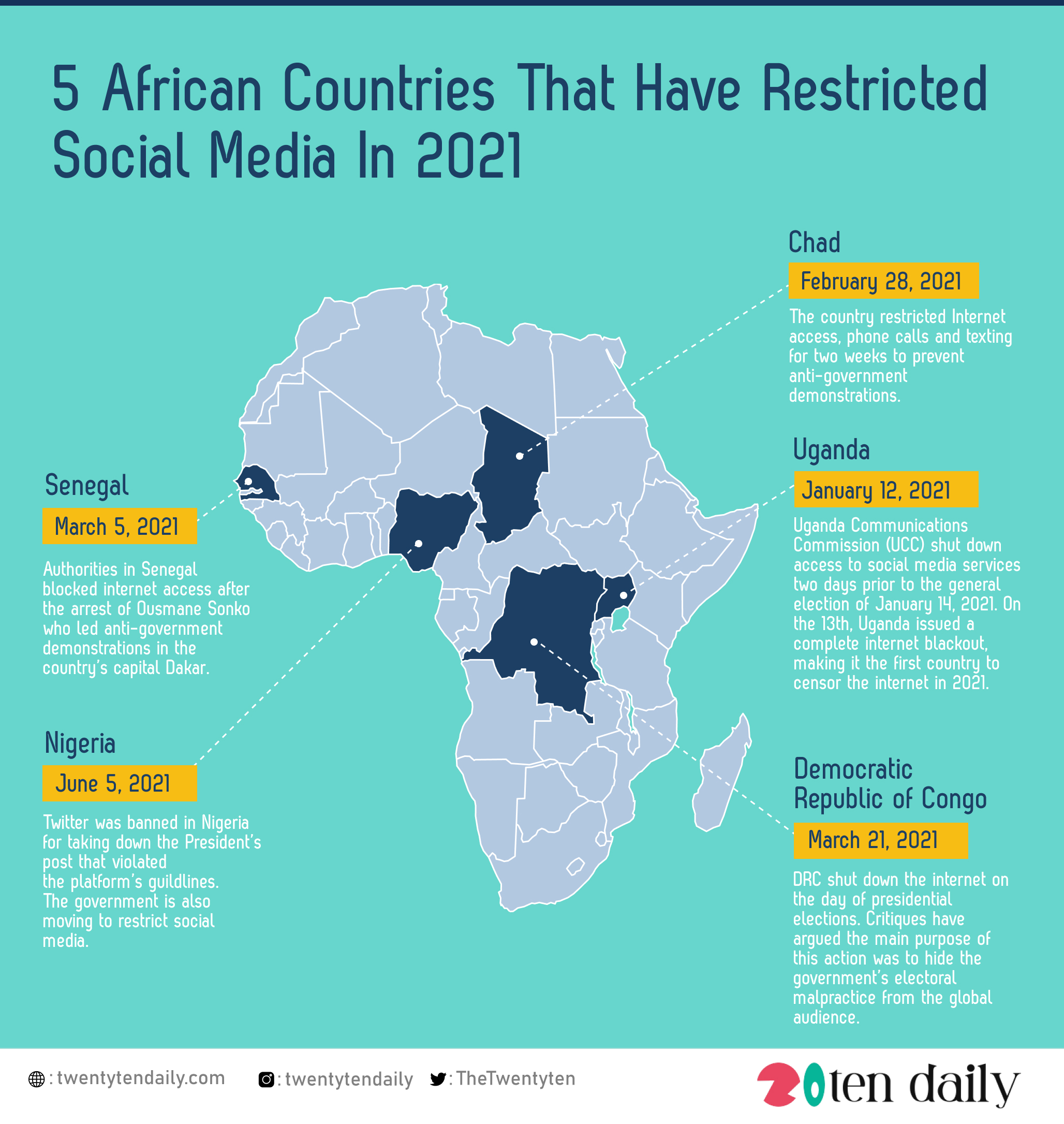5 African Countries That Have Restricted Social Media In 2021
Africa is forming a niche for itself as a continent with zero tolerance for the freedom of expression the internet and social media affords its citizens. About 30 countries have blocked or heavily restricted social media access between 2015 – 2021, especially during elections, protests, demonstrations, or examinations.
In 2021 alone, 5 African countries have gagged social media in the most outrageous ways that have called for intense public criticism both from the local and international audience.
Nigeria is the latest country to join the fold with its indefinite suspension of popular social media platform Twitter. The government did not factor in the economic disadvantage of its action like its counterparts.
This report visualizes social media restrictions in five countries in the African region and the economic implications in 2021.

The Economic Implication Of Internet/Social Media Ban
Foreign investments are important for Africa’s growth especially in these times of economic fragility. While each government might argue sovereignty in making decisions concerning banning or restricting social media, it is unarguable that these stands often become counterproductive.
Nigeria
Nigeria banned Twitter on June 5, 2021, after the social media platform removed a post by President Muhammadu Buhari that violated Twitter’s guidelines on inflammatory speech. The government has accused Twitter of fueling and funding protests that present the present administration in a bad light.
According to NetBlocks, Nigeria lost over 2 billion naira, 24 hours after the government suspended Twitter operations in the country.
Using Netblocks’ Cost of Shutdown Tool (COST), the Paradigm initiative estimates that Nigeria would further lose N90,712,044 ($250,600) every hour and a total shutdown would cost $5,593,819 per hour.
These amounts account for tech companies that rely on Twitter for their business as well as media and digital agencies who promote a chunk of their work on the platform
Chad
In the past 5 years, internet restrictions have been imposed on the citizens by local telecom operators following government orders. This has accumulated to almost two and half years of internet cuts or disruptions since 2016.
According to estimates by Internet Sans Frontières, a censorship operation in 2016 cost the nation up to $20.2 million.
From 2019 to 2021, Chad has lost over $23.1 million in bouts of internet and social media disruptions.
Uganda
NetBlocks calculated the cost of internet shutdowns in Uganda to be estimated at $1.7million a day. An amount that represents the aggregated cost of indirect losses as well as a direct consequence of businesses staying offline.
Using this measuring structure, Uganda’s 3-day social media and internet ban would have cost the country $5.1million.
Senegal
In Senegal, internet users and providers can make between 252,000 XOF ( $ 468.219) per month to 547,000 XOF (approximately $1017 ) per month (maximum average salary for web workers. actual maximum is higher).
Using the minimum average income as a meter and multiplying it by a total of 7.81 million users in Senegal, the country may have lost about $121,893,013 on the day it restricted access to the internet
Democratic Republic Of Cong (DRC)
According to NetBlock, DRC’s shutdown costs an economic downturn of $3 million or more. This paints a bleak picture for the people of the DRC and their government when putting into consideration its struggling economic status.
This trend of cutting off internet and social media access is one thing, but to cut it off at the expense of losing capital funds is a losing feat on both ends.
This trend must be stopped to protect and uphold human rights, and by so doing, resurrect Africa’s crumbling economy.



